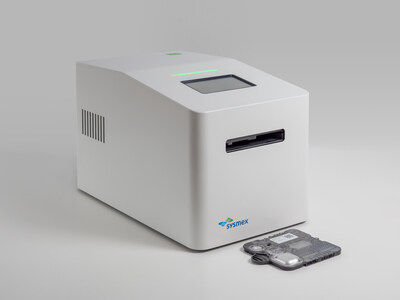- Challenge Works today announces that Sysmex Astrego’s PA-100 AST System has won the £8m (₹85 crores) Longitude Prize on AMR.
- Antimicrobial resistance (AMR) killed nearly 1.3 million people globally in 2019 and is on course to cause 10 million deaths a year by 2050.
- The winning test will be transformational for infection diagnosis and treatment, providing accurate antibiotic susceptibility results in 45 minutes – compared to the 2-3 day wait patients currently face.
- It can identify the presence of a bacterial infection in just 15 minutes and will enable the return of “retired”, first-line antibiotics.
LONDON, June 13, 2024 /PRNewswire/ — Following a decade of developments, and entries from more than 250 teams around the world, including 38 from India, the £8m/₹85 crores Longitude Prize on AMR has been awarded by Challenge Works (part of innovation agency Nesta) to the PA-100 AST System from Sysmex Astrego.
The Longitude Prize on AMR launched in 2014 – funded by Nesta – to incentivise the creation of new diagnostic tests that, in a matter of minutes, can identify whether an infection is bacterial, and if so, the right antibiotic to prescribe to slow the spread of antibiotic resistant infections. The goal is to replace the 2-3 day lab test process that doctors and patients must currently endure, and end “just in case” prescribing that is prevalent as a result.
The PA-100 AST System is an innovative diagnostic test based on technology from Uppsala University in Sweden [1]. The test will transform the treatment of urinary tract infections and brings the power of laboratory testing into a doctor’s office.
Using a 400 microlitre sample of urine on a smartphone-sized cartridge, the test can identify the presence of a bacterial infection in just 15 minutes and accurately identify the right antibiotic to treat it within 45 minutes. This supports health workers in their clinical decision making at the point of care, and opens up the significant possibility of previously “retired” first-line antibiotics coming back into use for patients.
Dr Abdul Ghafur, Consultant in Infectious Diseases, Apollo Hospitals, Chennai; Coordinator , “Chennai declaration” of medical societies, said:
“Rational use of antibiotics—choosing the appropriate antibiotic for the correct patient at the optimal time—is fundamental in saving lives and combating the superbug crisis. Rapid diagnostics are poised to be crucial in this effort. The winner of the Longitude Prize is set to spearhead the list of emerging rapid diagnostic technologies in a transformative manner. The applications for the Longitude Prize bring hope, suggesting that through collective action, we can look forward to a future protected from the threats of antimicrobial resistance.”
Dame Sally Davies, UK Special Envoy on Antimicrobial Resistance, former Chief Medical Officer of England said:
“Without antibiotics, modern medicine as we know it is in real danger of collapse. Every day, healthcare workers make urgent clinical judgements for the good of their patients, but we can no longer afford ‘just-in-case’ prescribing of antibiotics. The Longitude Prize winner lays the groundwork for a sea-change in how we manage these precious medicines, where healthcare workers are supported with rapid and relevant diagnostic tests to make the best decisions for their patients with confidence that they are prescribing the right drug, first time.”
Antimicrobial Resistance (AMR) is a growing and devastating pandemic where bacteria have developed resistance to the lifesaving antibiotics at the heart of modern medicine, following a century of unnecessary or untargeted prescriptions. In 2019, antibiotic resistant infections directly killed 1.3m people around the world and contributed to the deaths of 5m in total [2]. By 2050 it is predicted antibiotic resistant infections will cause 10m deaths annually [3]. The World Bank estimates antibiotic resistance could result in $1tn in additional health costs by 2050 and up to $3.4tn in lost GDP by 2030 [2].
In 20-30% of sepsis patients, the infection originates from the urinary tract, and urosepsis often develops from UTIs – up to two in five people that develop severe sepsis will lose their lives [4]. In India, data from 2016-2018 suggests increasing reliance, and in turn, resistance, to last-defence antibiotics such as colistin and vancomycin [5].
Mikael Olsson, CEO and co-founder, Sysmex Astrego, winners of the Longitude Prize on AMR said:
“The PA-100 AST System challenges bacteria present in a patient’s urine with microscopic quantities of antibiotics in tiny channels embedded in a cartridge the size of a smartphone. We rapidly pinpoint whether a bacterial infection is present and identify which antibiotic will actually kill the bugs, guiding doctors only to prescribe antibiotics that will be effective. The £8m prize will support us to tailor the test for use with different kinds of UTIs and antibiotics, speeding up access for more patients.”
The cartridge, containing a nanofluidic chip, is inserted into an analyser unit – about the size of a shoebox – which reads the chip sample at a cellular level. Designed to work in doctor’s offices, the analyser unit is fully automatic and maintenance free. It is the first time a point-of-care test is capable of identifying a specific infection and its susceptibility to specific drugs by observing how the patient’s infection responds in real-time to different antibiotics (a phenotypic test).
Since the PA-100 AST System identifies which specific antibiotic can treat an infection, it will likely allow retired antibiotics to be brought back into service because the test is able to demonstrate when an infection is susceptible to their effects.
The winning test paves the way for a future where the PA-100 AST System and similar technologies can transform infection diagnosis and treatment beyond UTI, through, for example, blood and sputum (saliva) tests to detect other infections.
The Longitude Prize on AMR is designed and delivered by Challenge Works – a Nesta enterprise. For more than a decade, Challenge Works has run 86 prizes, distributed £124 million in funding and engaged with 13,500 innovators across prizes tackling major health challenges, frontier technology, global sustainability and social impact.
Tris Dyson, Managing Director, Challenge Works said:
“We launched the Longitude Prize on AMR to create the urgent pull needed to get innovators working on one of the biggest life-and-death challenges facing humanity. Hundreds of teams competed, with multiple solutions now close to market thanks to the prize. I want this to be the start of a revolution in healthcare where rapid point of care diagnostics become a mainstay of medicine – creating a future where patients can quickly and accurately get a diagnosis and the correct treatment when they visit the doctor. The success of the Longitude Prize on AMR opens the door for many more prizes to tackle massive global challenges. Today’s news proves that, when there is a challenge of gargantuan proportions in desperate need of real-world solutions, prizes attract the brightest minds to solve the problem and leave a legacy of successful, growing businesses in their wake.”
For more on the Longitude Prize on AMR, visit longitudeprize.org
About Challenge Works
Challenge Works is a global leader in design and delivery of open innovation challenges that mobilise diverse, innovative thinkers to solve pressing problems and unlock change. Challenge prizes are a unique approach to funding innovation, offering a series of incentives, with a final prize given to whoever can first or most effectively meet a defined goal. They are public, open competitions which lower barriers to entry to attract the broadest possible community of innovators. Founded by Nesta, the UK’s innovation foundation for social good, we are a social enterprise that has delivered 86 challenges to date and distributed more than £124 million to winning innovators.
About the Longitude Prize on AMR
The Longitude Prize on AMR launched in 2014 to incentivise the creation of new diagnostic tests that, in a matter of minutes, can identify whether an infection is bacterial, and if so, the right antibiotic to prescribe to slow the spread of antibiotic resistant infections. The prize was funded by money committed by Nesta and Innovate UK in 2014. The Prize was delivered by Challenge Works. In June 2024, Sysmex Astrego’s PA-100 AST system was awarded the £8 million as winner.
References
[1] Baltekin, Boucharin, Tano, Andersson, and Elf (2017) Antibiotic susceptibility testing in less than 30 min using direct single-cell imaging. PNAS doi: 10.1073/pnas.1708558114 https://pubmed.ncbi.nlm.nih.gov/28790187/
[2] Antimicrobial resistance: Key Facts, World Health Organization (2023)
[3] Tackling drug-resistant infections globally: final report and recommendations, Jim O’Neill (2016)
[4] Prognosis Risk of Urosepsis in Critical Care Medicine: A prospective Observational Study, BioMed Research International (2016)
[5] Global access to existing and future antimicrobials and diagnostics: antimicrobial subscription and pooled procurement, The Lancet Global Health (2022)
Photo – https://mma.prnewswire.com/media/2435856/Longitude_Prize.jpg
![]() View original content to download multimedia:https://www.prnewswire.com/in/news-releases/from-3-days-to-45-minutes-rapid-test-for-uti-wins-8m-85-crores-longitude-prize-on-amr-to-transform-fight-against-superbugs-302169742.html
View original content to download multimedia:https://www.prnewswire.com/in/news-releases/from-3-days-to-45-minutes-rapid-test-for-uti-wins-8m-85-crores-longitude-prize-on-amr-to-transform-fight-against-superbugs-302169742.html








